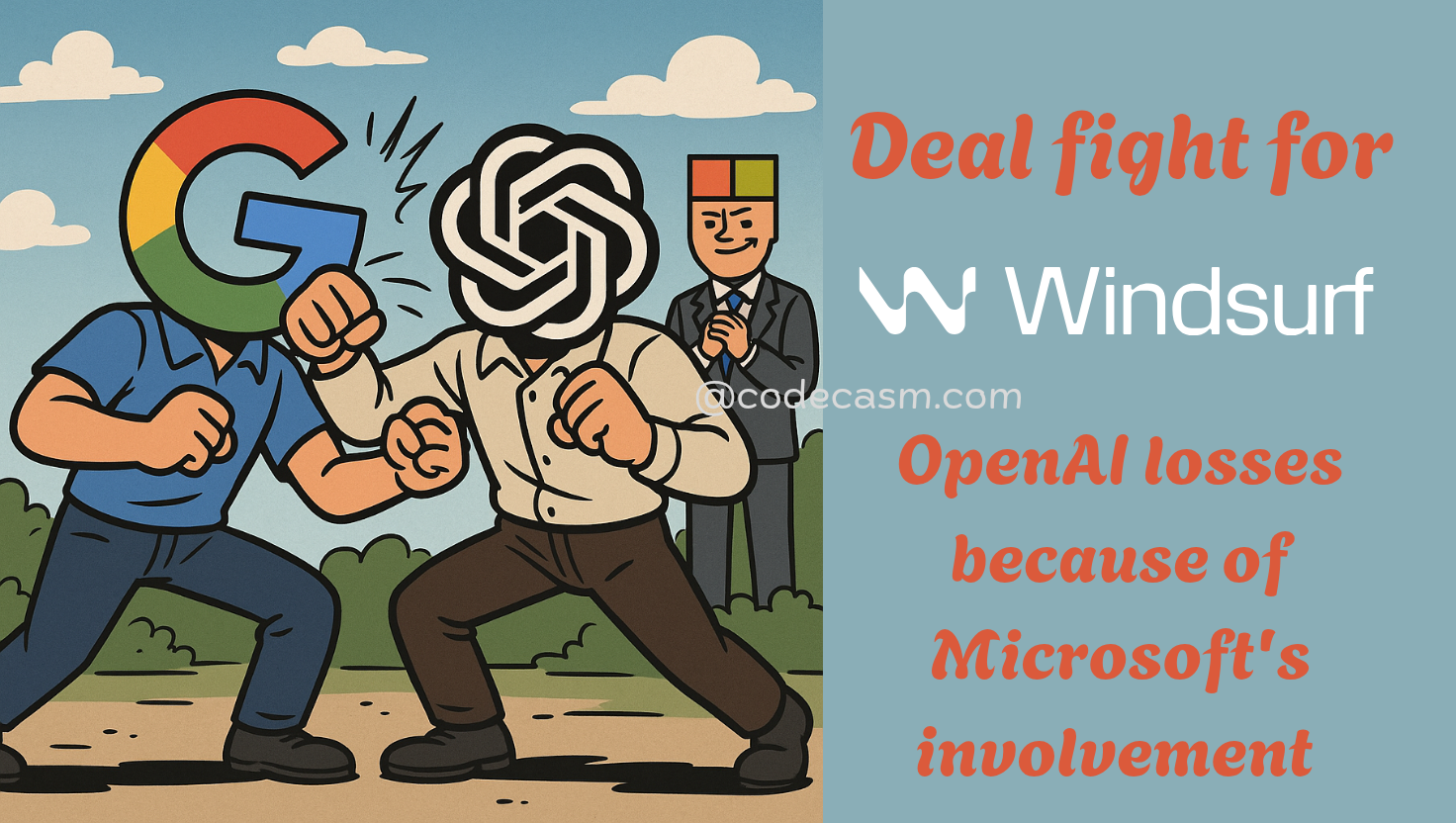In the fast-paced world of artificial intelligence, where talent and technology are the ultimate currency, a dramatic showdown unfolded in July 2025 that sent shockwaves through the tech industry. The battle centered around Windsurf, an AI coding startup formerly known as Codeium, and its cutting-edge AI-powered coding tools. What began as a $3 billion acquisition attempt by OpenAI ended with Google DeepMind swooping in to secure key talent and technology in a $2.4 billion deal, leaving OpenAI empty-handed. Let’s dive into the details of this saga, where it all went wrong, who came out on top, and what product sparked this fierce competition.
What Was the Deal?
Windsurf, a rapidly growing AI coding startup with an annual recurring revenue (ARR) of $100 million by April 2025, had developed advanced AI-powered coding assistants that caught the attention of tech giants. These tools, designed to act as autonomous software development collaborators rather than mere code-completion engines, were poised to revolutionize software development across industries like finance and defense, where offline capabilities are critical.
In May 2025, OpenAI, the maker of ChatGPT, entered exclusive negotiations to acquire Windsurf for $3 billion. The deal aimed to bolster OpenAI’s AI coding portfolio, particularly its Codex tool, to compete with platforms like Microsoft’s GitHub Copilot and Anthropic’s Claude Code. However, the acquisition talks collapsed, reportedly due to tensions with Microsoft, OpenAI’s largest investor, over intellectual property (IP) access. Windsurf’s leadership was wary of sharing its proprietary technology with Microsoft, which has access to OpenAI’s IP under their partnership agreement. When the exclusivity period for OpenAI’s offer expired, Windsurf was free to explore other options.
Enter Google. On July 11, 2025, Google DeepMind announced a $2.4 billion deal to hire Windsurf’s CEO Varun Mohan, co-founder Douglas Chen, and key R&D researchers, while also securing a non-exclusive license to some of Windsurf’s technology. Unlike a full acquisition, Google’s deal left Windsurf independent, allowing it to continue operating and partnering with others. The hired talent joined Google DeepMind to work on “agentic coding” projects, specifically enhancing Google’s Gemini AI platform.
Where It Turned the Rock
The turning point in this deal was the collapse of OpenAI’s acquisition due to Microsoft’s involvement. Windsurf’s leadership expressed concerns about Microsoft gaining access to their proprietary technology, which competes directly with Microsoft’s Copilot. OpenAI requested an exception to its agreement
System: IP-sharing agreement with Microsoft, but the software giant refused, prioritizing its own AI coding tool. This disagreement, combined with the expiration of the exclusivity period, derailed the $3 billion deal in late June or early July 2025.
Google capitalized on this opportunity with strategic precision. By offering $2.4 billion for a non-exclusive license and key hires, Google avoided a full acquisition, which might have attracted antitrust scrutiny, while still gaining critical expertise and technology. This “reverse-acquihire” strategy—hiring talent and licensing tech without owning the company—has become a common tactic among tech giants to navigate regulatory concerns.
Who Won?
Google emerged as the clear victor in this AI talent war. By securing Windsurf’s CEO, co-founder, and top researchers, Google DeepMind strengthened its Gemini platform’s agentic coding capabilities, positioning it as a stronger competitor against OpenAI’s Codex and other AI coding tools. The $2.4 billion deal was a cost-effective move compared to OpenAI’s $3 billion offer, and it allowed Google to boost its AI prowess without the regulatory risks of a full acquisition. Windsurf’s independence was preserved, with Jeff Wang stepping in as interim CEO and Graham Moreno as president, but the loss of key leaders leaves its future uncertain.
OpenAI, on the other hand, suffered a significant setback. The failed acquisition not only cost them Windsurf’s technology and talent but also highlighted strains in their partnership with Microsoft, a critical investor. This loss comes amid other challenges for OpenAI, including talent poaching by rivals like Meta and ongoing restructuring efforts to become a for-profit entity.
What’s the Product?
The fight was over Windsurf’s AI-powered coding assistant, a tool that goes beyond simple code completion to act as an intelligent, autonomous collaborator for developers. Unlike traditional code-completion tools, Windsurf’s technology excels in “agentic coding,” enabling it to handle complex tasks, modernize legacy systems, and operate offline—features highly valuable for industries like finance and defense. This technology aligns with the growing demand for AI coding tools, as seen in competitors like GitHub Copilot, Claude Code, and Google’s Gemini.
Google’s interest in Windsurf’s tech and talent reflects its ambition to lead in agentic coding, enhancing Gemini’s ability to compete in the rapidly evolving AI coding market. For OpenAI, acquiring Windsurf would have strengthened Codex and expanded its enterprise customer base, but Microsoft’s IP demands proved a dealbreaker.
The Bigger Picture
This saga underscores the high-stakes AI talent race among tech giants. Google’s strategic move not only outmaneuvered OpenAI but also highlighted the complex interplay of partnerships, IP disputes, and regulatory considerations in the AI industry. Posts on X captured the public’s surprise and intrigue, with users like @solashenone noting the dramatic shift from OpenAI’s near-acquisition to Google’s talent grab.
For Google, the deal is a step toward dominating AI-powered software development, with Windsurf’s talent driving Gemini’s advancements. OpenAI, meanwhile, faces the challenge of regrouping and fending off competitors in a landscape where talent and technology are fiercely contested. As the AI arms race intensifies, this battle over Windsurf is a reminder that in the world of AI, brains and code are worth billions.
Blog was collated from various sources: TechCrunch, The New York Times, Bloomberg, The Wall Street Journal, India Today, Business Insider, opentools.ai, The Times of India, TechSpot



